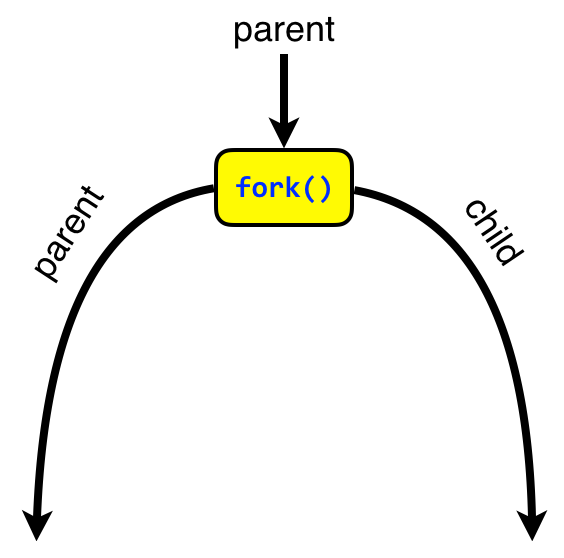Usually I don't create anything new in this professional blog, I just have a copy in my space with my understanding by exploring internet.
Process is any running instance of a program, and program is an executable file. This is an one line definition of process and program.
fork() is a linux system call to create a new child process by duplicating the calling process(parent). Both process run in the separate memory spaces. After a successful fork, the entire virtual address space of the parent is replicated in the child.
-1 returned in the parent which indicates no child process is being created.
0 indicates child process is being executed.
> 0 indicates parent process is being executed.
The child process is created with single thread, and child will not acquire parent's memory locks.
Output:
In the above program, parent process ()4685 doesn't wait til the child process executes, so we need to use wait() system call.
Output:
Sources
http://www.it.uu.se/education/course/homepage/os/vt18/module-2/process-management/
Process is any running instance of a program, and program is an executable file. This is an one line definition of process and program.
fork() is a linux system call to create a new child process by duplicating the calling process(parent). Both process run in the separate memory spaces. After a successful fork, the entire virtual address space of the parent is replicated in the child.
Return Value
Returns twice on success once in the parent and once in the child.-1 returned in the parent which indicates no child process is being created.
0 indicates child process is being executed.
> 0 indicates parent process is being executed.
The child process is created with single thread, and child will not acquire parent's memory locks.
#include <stdio.h> #include <unistd.h> //getpid, getppid, fork #include <stdlib.h> // EXIT_SUCCESS, EXIT_FAILURE void child () { printf("%s(), my pid is %d, and my parent's pid is %d\n", __func__, getpid(), getppid()); exit(EXIT_SUCCESS); } void parent(pid_t pid) { printf("%s(), my pid is %d, and my parent's pid is %d\n", __func__, getpid(), getppid()); exit(EXIT_SUCCESS); } int main() { pid_t pid = 0; printf("In %s\n",__func__); switch(pid = fork()) { case -1: perror("fork failed"); exit(EXIT_FAILURE); break; case 0: child(); break; default: parent(pid); break; } return 0; }
Output:
In the above program, parent process ()4685 doesn't wait til the child process executes, so we need to use wait() system call.
#include <stdio.h> #include <unistd.h> //getpid, getppid, fork #include <stdlib.h> // EXIT_SUCCESS, EXIT_FAILURE void child () { printf("%s(), my pid is %d, and my parent's pid is %d\n", __func__, getpid(), getppid()); exit(EXIT_SUCCESS); } void parent(pid_t pid) { printf("%s(), my pid is %d, and my parent's pid is %d\n", __func__, getpid(), getppid()); exit(EXIT_SUCCESS); } int main() { pid_t pid = 0; printf("In %s\n",__func__); switch(pid = fork()) { case -1: perror("fork failed"); exit(EXIT_FAILURE); break; case 0: child(); break; default: wait(NULL); parent(pid); break; } return 0; }
Output:
In main
child(), my pid is 28908, and my parent's pid is 28907
parent(), my pid is 28907, and my parent's pid is 28902
|
Sources
http://www.it.uu.se/education/course/homepage/os/vt18/module-2/process-management/


Comments
Post a Comment